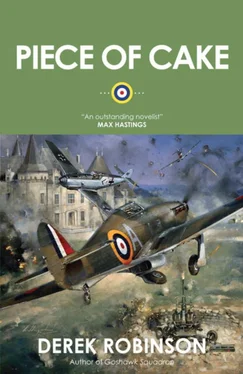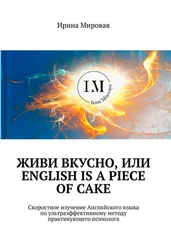The straggler he found and fancied was a tattered Dornier with its undercarriage down. He followed it through a confused patch of sky, all flak-bursts and con-trails and roving fighters, and as he gained on it a solitary Spitfire saw him and came over. This was reassuring: it let Cattermole concentrate on his kill. But he was still out of range of the Dornier when gunfire hacked a string of holes in his port wing and he had to break hard right. As he banked he glimpsed his attacker. It was the Spitfire, and it was still coming for him. It knocked chunks off his rudder and it battered his back-armor before he shook it off.
“You chump!” Cattermole shouted. “You blundering buffoon!” He deliberately cocked his wings to display the roundels. “See, you silly man? I’m on your side.” The Spitfire came at him again, and now he lost his temper, wrenched the Hurricane into a shuddering turn and took a snap shot. This merely angered the other pilot. The Hurricane wallowed as Cattermole tried to force more bank out of it. His legs ached, his nose dripped blood. Both hands clamped the stick, heaving as if they could lever the plane around. In the corner of his eye he saw the curl of wings. The Spitfire was making another attack. “Cretinous peasant!” he bawled. The words turned into a scream. For the first time in his life Cattermole tasted terror.
Everything was going wrong. His Hurricane was clumsy and heavy and slow, while this murderous fiend was lithe and tireless and fast. Cattermole raged at the man’s stupidity, at his madness. He pounded the canopy, shouting: “Can’t you see? Can’t you see? ” until his voice cracked. A knife-edge silhouette swam into his mirror. Brownings crackled, and fresh holes chased themselves across his wings. Cattermole’s bladder emptied itself. He was screaming and praying at the same time.
Then, unexpectedly, the Spitfire overshot. There was a glorious moment when it sat slap in front of him and he stopped screaming and pressed his gun-button. Compressed air whistled, breech-blocks clanked. No ammunition. Cattermole wept.
The Spitfire sheered off. It had seen its mistake. It climbed, and circled twice. Cattermole tried to read its number, but his eyes were full of tears and his head was trembling like a drunk’s. The Spitfire flew away.
It should have stayed. Cattermole was, by now, miles from the main raid. He was out of ammunition, his engine was leaking glycol, he could maneuver only sluggishly, and there were no friendly fighters to which he could attach himself. His compass was broken but he could see the Channel and he steered for where he guessed Brambledown should be. He was making a Mayday call when he met a flight of Me-109’s, also in the process of going home. He stopped speaking, and stopped breathing. They looked so neat and well-behaved, he couldn’t believe they would do him any harm.
His lungs jerked, demanding air, and he coughed. The dribble from his nosebleed spattered everywhere. “For Christ’s sake someone help me,” he said.
“Bearskin Yellow,” the Mayday controller said, “transmit for fix, transmit for fix.”
“Oh Jesus,” Cattermole whispered. The 109’s had made a small deviation to their course. As he reached up to slide back the hood they came within range. His arms were still raised when a converging cone of bullets hacked through the side of the cockpit and killed him.
His straggler, the tattered Dornier with its wheels down, didn’t last long: someone else found it and finished it off. The Kent coastline was dotted with columns of smoke, markers on the German route. Yet the raid churned on.
By now Barton’s wingman had turned for home, his guns empty. Barton made one more pass at a bunch of Ju-88’s, decided the storm of defensive fire was too heavy, and broke away, checking the sky above and behind. He searched for the tail of the parade and saw only more bombers emerging from the horizon.
For a moment the odds sickened him. Then he was overtaken by a sense of outrage. He thought: What the hell do these Huns think they’re doing? Whose country is this, anyway? He turned on the nearest formation. Heinkels, black and hulking. They saw him coming. Tracer throbbed from the gun-turrets and seemed to stretch itself toward him, lazily, casually, until suddenly the stuff was streaking past the cockpit so fast that he hunched his shoulders. The Heinkel he’d picked out jinked, but ponderously and too late. His bulletstrikes hammered its fuselage, making bright splashes of orange. Then Barton was half-rolling and diving away. Across his blurred vision passed a scattering of images: a Spitfire shedding a wing; a Dornier going round in circles, one engine on fire; flak appearing like smuts on a window; rank upon rank of raiders, all as ordered as tin soldiers; and—dangerously big—a pair of 109’s, racing to the defense of the Heinkels. Barton saw spirals of white smoke leaping from their wings, and cursed, and before the curse was finished they were far behind him, chasing some other poor bastard.
Barton circled, and saw his Heinkel. It was on its back, leaking flame and falling fast. A kill.
He enjoyed the kick of triumph, but it faded and he suddenly felt washed-out. That reaction scared him to the point of panic. He knew a kill broke his concentration, left him slack and dull: easy meat. He purposely frightened himself even more, stretched his muscles, gulped oxygen, prayed that Jerry would leave him alone while he dredged up some adrenalin. Automatically every ten seconds he changed direction. Voices scratched faintly but urgently in his headphones: Green Two, break!… I see him… Lost you, Yellow One… Watch that bloody 88! … I’m up-sun, Yellow Two… Got him, got the bugger!… How’s your ammo?… Look out, you silly bastard… Break, for Christ’s sake… .
CH3 was also alone, his wingman having baled out of a cockpit flooded with smoke. CH3 had had a brisk flurry of fighting, and now he felt curiously carefree. The battle was insanely lopsided: it might be desperate but it wasn’t serious. So why did a nervous tremor keep shaking his left leg? Maybe it was trying to tell him something. “Speak up, dummy,” he told it, just as a pair of 109’s bounced him and nearly spoiled the joke. He broke so violently and banked so steeply that the g-forces dragged his oxygen mask down his face, skinning his nose and forcing him to breathe through his mouth. Absurdly, a stray Messerschmitt wandered in front of him, apparently in a dream: its prop gently windmilling, its wings trembling like a butterfly’s. Before he could fire, the dream ended; the enemy vanished. CH3 was left circling, searching. He shoved his mask up and wiped saliva from his chin.
A lone Hurricane stooged over to join him. He recognized Fanny Barton. For a few seconds they flew side by side, high above the bomber stream. Down through the haze they could make out docks and warehouses. A sudden avenue of explosions sprang up as the first stick of bombs struck. Nothing could save London now.
“Got anything left?” Barton asked.
“Couple of squirts, maybe.”
Barton put his nose down and CH3 followed. At once, tracer pulsed up at them, crisscrossing: it was like diving into a network of lights. CH3’s neck-muscles stiffened, and the tremor in his left leg began kicking again. Blood thumped in his temples and in his wrists: the old familiar drumbeat of fear. Then they were through the net and hacking at the bombers’ flanks.
With a story like Piece of Cake the reader is entitled to know how much is fact and how much fiction.
Hornet squadron is fiction. The places where it was based do not exist. All the characters in the story are invented. Everything else is as authentic as I could make it.
Читать дальше












